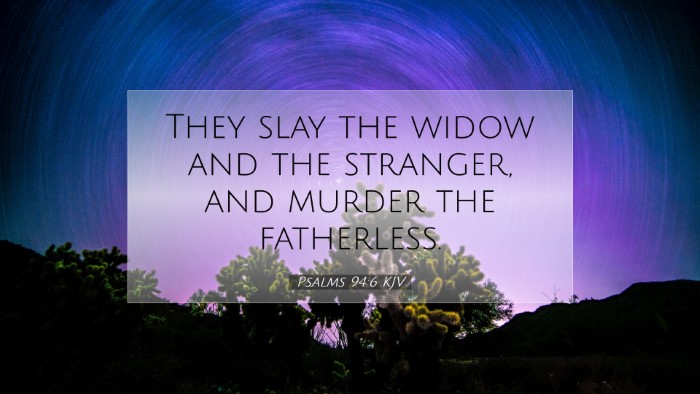Commentary on Psalms 94:6
Bible Verse: Psalms 94:6 "They slay the widow and the stranger, and murder the fatherless."
Introduction
The Book of Psalms encompasses a wide range of themes, from praise and worship to lament and justice. Psalms 94 is particularly poignant in its assertion of God's justice amidst widespread injustice. The verse in focus, Psalms 94:6, serves as a grim indictment of those who perpetrate violence against the vulnerable—specifically the widow, the stranger, and the fatherless. This commentary seeks to bring together insights from notable public domain commentaries, enhancing our understanding of this verse's theological and practical implications.
Contextual Analysis
Before delving into the specific verse, it is important to understand the broader context of Psalms 94. This psalm is often viewed as a cry for justice, highlighting the psalmist's anguish over the wickedness that permeates society.
- Historical Context: The psalmist addresses an audience steeped in Israel's covenantal traditions where justice is paramount. The evildoers mentioned are not merely external adversaries but may include those within the community who reject God’s law.
- Theological Context: The psalmist wrestles with the apparent silence of God as evil triumphs. This reflects a broader theological theme where God’s equity is challenged by human depravity.
Exegesis of Psalms 94:6
In examining this verse, we find an alarming portrayal of social injustice. The three groups mentioned—the widow, the stranger, and the fatherless—represent the most vulnerable members of society.
- Widow: In ancient Israel, a widow was often left without support or protection, making her susceptible to exploitation. The killing of a widow signals a complete moral decay.
- Stranger: The term 'stranger' indicates those who are not native Israelites, yet they were to be treated with compassion. The mistreatment of foreigners violates God's mandate to love one's neighbor, exemplifying a failure to uphold justice.
- Fatherless: The fatherless children represent the innocent who are left unprotected due to the failures of others, particularly the societal leaders. The act of murder against them highlights a horrifying disregard for human life.
Insights from Prominent Commentators
This section synthesizes the perspectives offered by notable commentators.
Matthew Henry
Henry emphasizes the contrast between the wicked's actions and God's ultimate justice. He notes that the oppression of the vulnerable "is an affront to God," illustrating that such sins will not go unnoticed. He draws attention to the fact that those who do wrong, especially those who harm the defenseless, court divine retribution.
Albert Barnes
Barnes provides a thorough investigation into the social implications of this verse. He reflects on the ethical duties of a society to protect its weakest members. Pointing to the moral responsibilities outlined in the law, Barnes insists that neglecting the needs of the widow, stranger, and orphans is contrary to a life in obedience to God’s commands. He highlights the inevitable consequences that arise from societal injustice.
Adam Clarke
Clarke's commentary serves to deepen the emotional resonance of the verse. He expresses that slaughtering the widow, stranger, and fatherless is emblematic of deep moral corruption. He draws a parallel between the psalmist's plea for justice and the need for believers today to advocate for those who are marginalized and oppressed. Clarke’s view underscores the urgency of intercession before God for divine intervention against evil.
Theological Implications
Psalms 94:6 evokes a strong theological response from believers. It challenges the church and its members to reflect on their commitment to justice.
- Divine Justice: The verse affirms the belief in a just God who sees and responds to oppression. The expectation is clear: God will hold the wicked accountable.
- Human Responsibility: Believers are called to be advocates for those who cannot advocate for themselves. Responding to the needs of the vulnerable is not merely an act of charity but a divine mandate.
- Hope for Redemption: Even in despair, this psalm offers hope that God will ultimately rectify injustice, offering comfort to those who suffer at the hands of the wicked.
Application for Today
In today’s context, Psalms 94:6 presents critical reflections for personal, communal, and societal application:
- Pastoral Care: Pastors are challenged to ensure that their ministries address issues of justice, providing support and advocacy for the marginalized.
- Conscience of Society: The awareness of social injustices should lead communities to active involvement in addressing issues such as poverty, human trafficking, and systemic oppression.
- Personal Reflection: Individually, believers must examine their attitudes toward those who are vulnerable and consider how they can act justly, love mercy, and walk humbly with their God (Micah 6:8).
Conclusion
Psalms 94:6 serves as a somber reminder of the consequences of societal injustice and the divine imperative to pursue justice on behalf of the vulnerable. By synthesizing insights from historic commentaries, we can appreciate the richness of scripture and be compelled to take action. As theologians, students, and church leaders, it is imperative to embrace a holistic view of justice that includes advocacy, mercy, and righteousness. Let this verse compel us to be instruments of God’s justice in a world that desperately needs His light.


